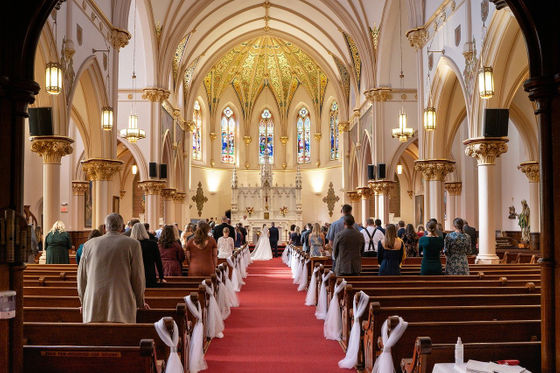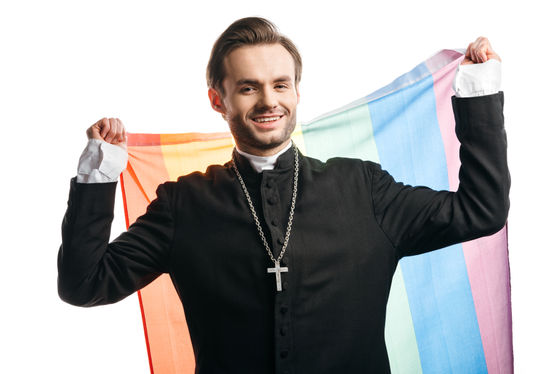Discovered that a Catholic group bought app data to track gay Christian priests

A group of Christians in Colorado spent millions of dollars buying mobile app data to track priests who used gay dating apps, according to The Washington. This was confirmed by a Post report. While the series of scandals has been criticized for being gay-discriminatory, there is also a deep-rooted opinion that it is a natural duty for clergy to behave modestly, regardless of their sexual orientation. Ripples are spreading in American society as a complex issue involving the discussion of the surveillance society.
Colorado Catholic group bought app data that tracked gay priests - The Washington Post
Working for Church Renewal | Jayd Henricks | First Things
https://www.firstthings.com/web-exclusives/2023/03/working-for-church-renewal
The Washington Post reported on March 9, 2023 that a Denver, Colorado, nonprofit group called Catholic Laity and Clergy for Renewal (CLCR) will , reported that it had obtained data from dating apps Grindr, Scruff, Growlr, and Jack'd, which are mainly used by gay men, and OkCupid, a site used by people of various sexualities. An insider familiar with the project testified, 'Most of the data was from Grindr, and the survey was aimed at finding gay priests.'
According to two anonymous sources who provided the information, the CLCR project involved the resignation of Jeffrey Barril, the chairman of the United States Catholic Bishops Conference (USCCB) after being exposed for using Grindr. Members who were involved in the incident in July 2021 are also participating.
It was discovered that many clergymen were using a ``gay dating app'' and the Vatican shook, and there was also a case of stealing an offering for a lover-GIGAZINE

The tracking of a gay priest with a smartphone app made headlines around the world, with critics calling the incident 'weaponized anti-gay surveillance.' On the other hand, Jade Henricks, president of CLCR, wrote in an article for the Christian magazine First Things, 'This kind of app is specialized for casual and anonymous sexual encounters. Note that this is not about a priest or a seminary student being straight or gay, but a testament to church duty that harms everyone involved in some way or another. That's it,' he countered.
Documents obtained by The Washington Post stated that CLCR obtained information collected on ad exchanges through data brokers. CLCR said that it matched the app data with the address of the church and the location of the seminary, and identified the clergy who used the dating app.
CLCR spent at least $4 million on the project and shared the data it found with a dozen clerics. So far, it has not been confirmed that using the app led to resignation or dismissal except for Mr. Barril mentioned above, and the impact of the CLCR project is unknown. ``If a clergy is denied a promotion or forced to retire early, it's not customary for the reason to be disclosed,'' said one of the sources.

A Grindr spokesperson told The Washington Post that Grindr stopped sharing location information in early 2020. Other app operators, such as Growlr and Scruff, also said they did not share location information with third parties during CLCR's investigation. On the other hand, Matt Voda, CEO of marketing company OptiMine, pointed out, ``Major apps have changed their policies to respond, but the buying and selling of accurate location information is still commonplace in the digital advertising industry.'' bottom.
In a First Things post, CLCR's Henriks said, 'Every business is using app data, so why shouldn't
The report raises not only the privacy issue, in which a private group used data from the app to identify individual behavior, but also the long-standing debate over clergy sexuality. Conservative Christians have taken issue with gay clergy, pointing out that most of the victims of sexual abuse by Catholic clergy in recent decades have been men. Victim advocates, meanwhile, argue that the problem is not the gay clergy, but the simplification of the debate around celibacy and clergy sexuality.
The Sixth Commandment of the Ten Commandments of the Catholic Church states, 'You shall not commit adultery .' This leads to clerical celibacy and chastity in the case of married congregations, but what specifically violates this commandment has been discussed by church leaders long before the advent of the digital world. Opinions have been divided between

For example, even experts disagree on whether installing a dating app on a smartphone, engaging in sexual conversations on that app, or watching sex in a public bath constitutes sexual activity as stipulated by canon law . It says it doesn't match.
``This is not a new problem, and the Internet is just a new tool,'' said Jennifer Haselberger, a canon law scholar who has worked in the parish of Minneapolis, etc., and a priest installs Grindr on a smartphone. He expressed the view that simply doing so does not violate the sixth commandment.
Also, Father Gerald Murray, a canon law scholar in New York, said, 'I think it's good that Mr. Barril was pursued, but it's gaslighting to call the focus on Grindr 'anti-gay' The essence of the problem is adultery and scandals against Christians.'
Related Posts:
in Note, Posted by log1l_ks




